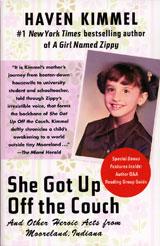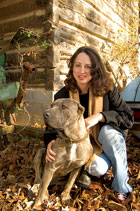Haven Kimmel’s 2006 book She Got Up Off the Couch, and Other Heroic Acts from Mooreland, Indiana is a literary retronym: It’s a nonfiction memoir.

Time was, all memoirs were true. Real names and real places and real events added up to real life, and nobody worried that the author had flashed her poetic license and concocted her story. But ever since Vivian Gornick confessed she created composite characters for her acclaimed Fierce Attachments, praised by The New York Times as “unflinchingly honest”; Augusten Burroughs euphemistically described his written personal history as “imaginative re-creation” and former screenwriter James Frey tried to fool Oprah with his fairy tale of jail time and drug abuse, savvy readers have suspected the only real thing in most memoirs is the feeling (although the scoundrelly Frey proved even that could be faked).
With Couch, Kimmel resurrects the original meaning of memoir: an unembellished narrative of stuff that happened. Although her writerly voice is decidedly modern—she writes about her family’s domestic mini-dramas from her perspective as a grade-school girl—her approach is old-fashioned. While her peer memoirists were imagining fantastical conclusions to their own life stories, she was leafing through moldy copies of the Farmer’s Almanac, double-checking her recollections of winter blizzards against its trusty weather grids.
“I was so careful,” says Kimmel, who’s now touring in support of the paperback version of Couch. “I sent the manuscript to everyone who was mentioned in it.”

Kimmel’s earnest integrity isn’t just the outgrowth of her Midwestern upbringing. Her 2001 bestseller A Girl Named Zippy: Growing Up Small in Mooreland, Indiana was privately panned by two of the people who appeared in the book, much to Kimmel’s distress. The book of loosely linked essays, written in a sarcastic, immature tone instantly familiar to fans of Ramona Quimby, began as a personal writing project and was never fully vetted for its potential to create hurt feelings.
“There were places where for the sake of humor, I was glib,” Kimmel admits. “I thought that I’d been very loving. I thought I was mindful of being kind. But one person with hurt feelings was too many.”
Kimmel—a friend of Burroughs, who relishes being bitchy in print—made sure Couch would be thoroughly inoffensive, a somewhat tricky business when writing from the point of view of a child who is as emotionally insensitive as all pre-adolescents. How exactly does one clean up the conversation of a kid who loudly asks a disabled boy what’s wrong with him, and who makes fun of old people?
“I try to be true to my voice,” Kimmel explains. “That’s about as honest as you can be while being careful. At what point can you say, ‘for the sake of an artistic end, I’m going to cross the line?’”
To stay true, Kimmel worked in close collaboration with her mother, an accomplished writer who’s finishing a science-fiction novel—“the plot is so shockingly good,” kvells Kimmel—and the hero of Couch. Delonda appeared in Zippy, but her character is so fully drawn in the second book it’s astonishing to imagine the two Delondas as cousins, let alone the same person.
Kimmel worked from her mother’s unpublished diary to develop Couch, the story of how Delonda—a pious Quaker with a fondness for watching TV—courageously went back to school and emerged as a lively intellectual.
“She allowed me to make it a book about her,” says Kimmel, who called her mother every night to read her what she’d written.
“I’d ask her to tell me if it didn’t sound like me,” she reports. “There was one line she said didn’t sound like my dad. That line’s gone now.”
For all its accuracy, inoffensiveness and mother-worship—or maybe because of it—Couch isn’t as fun a read as its predecessor. It’s extremely well-written, but the prancing gait of Zippy has been slowed to a measured walk. That’s OK by Kimmel, who strongly prefers Couch.
“I like it much better,” insists the author, who briefly toured regionally for the hardcover release of Couch before her doctor put her on bed rest for her third pregnancy. “When I read in Durham and Raleigh, the crowds were massive. I think they felt more depth.”
At the same time, Couch has been less popular with the pre-teen set who lapped up Zippy. While Zippy was intended to appeal to an adult audience, young readers couldn’t resist the cover, emblazoned with a funny-looking baby, and its story of a mischievous little girl who loves animals.
“The subtleties of Zippy were often missed,” says Kimmel. “It’s a book you read and there’s a shadow book behind it, what’s not being said about the conditions in which I lived. The reviewers kept saying it was dreamlike. Couch has specificity.”
[Hanna Rachel Raskin is Xpress‘s food editor.]
Haven Kimmel reads from her new book at Malaprop’s Bookstore (55 Haywood St.) on Friday, March 9. 7 p.m. Free. 254-6734.



I live in Mooreland. We went to school with Zippy and her siblings. I enjoyed Zippy so much since I know the people. I know several “errors” in her story too. I see how a few of the Moorelandites would be upset.